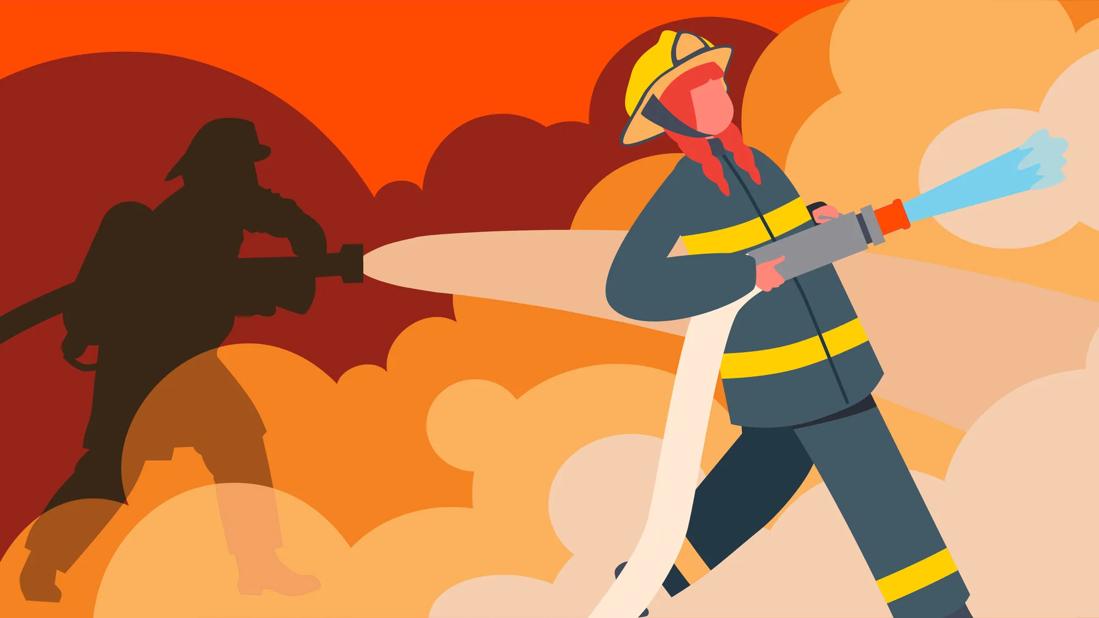Breathing in toxic smoke can lead to serious health problems

Image content: This image is available to view online.
View image online (https://assets.clevelandclinic.org/transform/c1f7a046-ec79-46f6-a1dc-54f7b3117130/wildfire-smoke-firefighters-1408128458)
Two firefighters with hoses amidst smoke
Wildfires are becoming a more regular occurrence as increasingly hot, dry weather turns forests into tinder. In addition to the damage these out-of-control blazes inflict on structures and the landscape, the effects of smoke can cause serious health problems.
Advertisement
Cleveland Clinic is a non-profit academic medical center. Advertising on our site helps support our mission. We do not endorse non-Cleveland Clinic products or services. Policy
Pulmonologist Neha Solanki, MD, discusses the dangers of wildfire smoke and how to protect the air you breathe.
Yes, smoke is made of particulate matter (solid or liquid particles from things that have burned, like houses and manufactured items), fumes and gases like carbon monoxide and cyanide.
“Breathing in those toxic fumes and gases can cause short-term and long-term symptoms and complications,” states Dr. Solanki. “Your primary goal should be to find fresh air to minimize harmful effects.”
If you’re breathing in wildfire smoke, you may notice symptoms like shortness of breath, a sore throat, cough, headache and dizziness. You may also notice that your eyes sting and your voice may be hoarse.
And those aren’t the only effects wildfires have on people. Inhaling large amounts of wildfire smoke can also cause airway inflammation and lead to lung conditions like asthma and chronic obstructive pulmonary disease (COPD). There’s also a connection between wildfire smoke and cardiovascular disease.
You don’t have to live near wildfires to have them affect your breathing either. Smoke from larger wildfires often travels thousands of miles while riding the Earth’s jet streams.
“Wildfire smoke can rise up to 14 miles into the air and then is carried with wind currents, which is why it affects everyone,” shares Dr. Solanki.
Advertisement
Anyone with underlying chronic respiratory conditions or cardiovascular disease is more affected by wildfire smoke. Also, those who are pregnant, people over the age of 65, smokers and children are more likely to experience the negative effects of wildfire smoke.
There’s even evidence that exposure to particles in the air can increase the likelihood that someone might get the flu, COVID-19 or a cold. The reasoning? Breathing in smoke can weaken your immune system so it can’t fight off viruses like normal.
“We breathe in smoke particles, which get into our bloodstream through the lungs,” Dr. Solanki explains. “These particles then stick to a location in our body, activating the immune system and causing an inflammatory response.”
For those who are pregnant, breathing in the toxic smoke can delay fetal development and make children more likely to get asthma later in life.
First, make sure you’re out of harm’s way from any active wildfires. Then, you can improve the air quality around you using these tips:
Air quality is determined by the number of different particles in the air: ozone, nitrogen dioxide, sulfur dioxide and carbon monoxide. Air quality can range from zero to 500.
If the air quality is 0 (zero) to 50, it’s considered safe. Ranges from 50 to 100 signal an increase in harmful particles, so it’s recommended that individuals with chronic respiratory diseases stay inside. If the air quality is above 200, it’s a cause for concern and everyone — underlying conditions or not — should stay inside.
Think you’ve been exposed to wildfire smoke? There are things you can do at home like drinking lots of water, using a saline nasal spray and increasing your intake of antioxidants. If you’re feeling effects from the smoke, like trouble breathing, a cough or chest tightness, Dr. Solanki advises seeking treatment immediately.
“As wildfires are becoming more prevalent, we’re also seeing more chronic respiratory diseases in the same areas as well,” she says. “If you have symptoms, then definitely see a physician.”
Advertisement

Sign up for our Health Essentials emails for expert guidance on nutrition, fitness, sleep, skin care and more.
Learn more about our editorial process.
Advertisement
Watch the weather, keep lines of communication open and make sure everyone on board has access to a personal lifejacket or flotation device
From bug bites and blisters to sunstroke and swimming safety, here’s how to stay well this season
From split lips to splinters, a little first aid can get your kiddo back on the swing set in no time
Breathing in unhealthy air can harm your lungs, heart and more
Establish rules and have a safety plan in place
As temperatures increase, so does the need for safety precautions
Prevent irritation, illness and more by using pool chemicals the right way
Make sure your wood has been split and stored for at least 6 months
Prioritize your health by managing stress, strengthening your social connections and getting quality sleep
Bolsters, blankets, pillows and blocks can offer extra support, stability and comfort
Allergies, postnasal drip, asthma or reflux could be to blame for a cough that won’t quit